Common Forex Trading Mistakes and How to Avoid Them

Forex trading, with its promise of significant returns, attracts millions worldwide. However, many traders, especially beginners, fall victim to common mistakes that can derail their success. By identifying these pitfalls, traders can refine their strategies and improve their odds of succeeding in the volatile forex market. Below, we explore the most frequent Forex Trading errors and how to steer clear of them.
1. Lack of a Trading Plan
One of the cardinal sins of forex trading is entering the market without a solid plan. New traders often jump in based on market hype, gut feelings, or random tips without considering a structured approach. A trading plan should include goals, risk tolerance, and clearly defined strategies. Without this, decisions can become impulsive, resulting in unnecessary losses.
Solution: Develop a detailed trading plan before executing any trade. This plan should outline entry and exit points, risk-reward ratios, and contingency strategies to handle market volatility.
2. Overleveraging
Leverage is one of the most enticing—and riskiest—aspects of forex trading. While it offers the potential for significant gains, it also amplifies losses. Traders who overleverage their positions may wipe out their accounts after just a few trades. For instance, many retail traders use leverage ratios of 1:100 or higher, dramatically increasing their exposure.
Solution: Stick to conservative leverage ratios (e.g., 1:10) suited to your experience level. Additionally, use stop-loss orders to limit your downside potential.
3. Ignoring Risk Management
Many traders focus solely on profits while overlooking risk management. Neglecting to limit losses on individual trades or risking too much capital can quickly lead to financial ruin. Data suggests that 90% of retail traders fail due to poor risk management practices.
Solution: Implement strict risk management rules, such as limiting your risk per trade to 1-2% of your account. This ensures longevity even during unfavorable market periods.
4. Trading Based on Emotion
Fear and greed are the enemies of forex traders. Emotional trading often leads to overtrading, revenge trading, or holding onto losing positions in the hope of a market reversal. These behaviors cloud judgment and lead to irrational decisions.
Solution: Maintain discipline and avoid making decisions during periods of heightened emotional stress. Use tools like automated trading algorithms to execute your strategy objectively.
